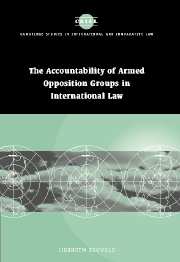Book contents
- Frontmatter
- Contents
- Table of treaties and declarations
- Table of cases
- Table of other documents
- List of abbreviations
- Introduction
- PART 1 THE NORMATIVE GAP
- 1 Legal restraints on armed opposition groups as such
- 2 Substantive obligations of armed opposition groups as such
- PART 2 THE ACCOUNTABILITY GAP
- Conclusion
- Bibliography
- Index
- CAMBRIDGE STUDIES IN INTERNATIONAL AND COMPARATIVE LAW
1 - Legal restraints on armed opposition groups as such
Published online by Cambridge University Press: 28 July 2009
- Frontmatter
- Contents
- Table of treaties and declarations
- Table of cases
- Table of other documents
- List of abbreviations
- Introduction
- PART 1 THE NORMATIVE GAP
- 1 Legal restraints on armed opposition groups as such
- 2 Substantive obligations of armed opposition groups as such
- PART 2 THE ACCOUNTABILITY GAP
- Conclusion
- Bibliography
- Index
- CAMBRIDGE STUDIES IN INTERNATIONAL AND COMPARATIVE LAW
Summary
The first question is that of applicable law. It is only when the law to be applied has been settled that one can examine its content, which will be done in the next chapter.
Practice of international bodies convincingly demonstrates that international humanitarian law applicable to armed opposition groups extends well beyond Common Article 3 of the Geneva Conventions and Additional Protocol II to the Geneva Conventions. It remains the case, however, that the ‘new’ humanitarian law applicable to armed opposition groups concerns principles rather than detailed rules. It is unclear whether armed opposition groups are bound by human rights law. International criminal law as it currently stands does not apply to armed opposition groups as such, and probably rightly so.
Common Article 3 and Protocol II
Treaty law
International bodies have uniformly affirmed the applicability of Common Article 3 and Protocol II to armed opposition groups as a matter of treaty law.
Common Article 3 provides: ‘In the case of armed conflict not of an international character occurring in the territory of one of the High Contracting Parties, each Party to the conflict shall be bound to apply as a minimum the following provisions.’ Despite the clarity of this provision, both states and commentators have sometimes suggested that Common Article 3 does not bind armed opposition groups or that it applies only to the individual members of these groups, rather than to the group as a whole.
- Type
- Chapter
- Information
- Publisher: Cambridge University PressPrint publication year: 2002
- 1
- Cited by



